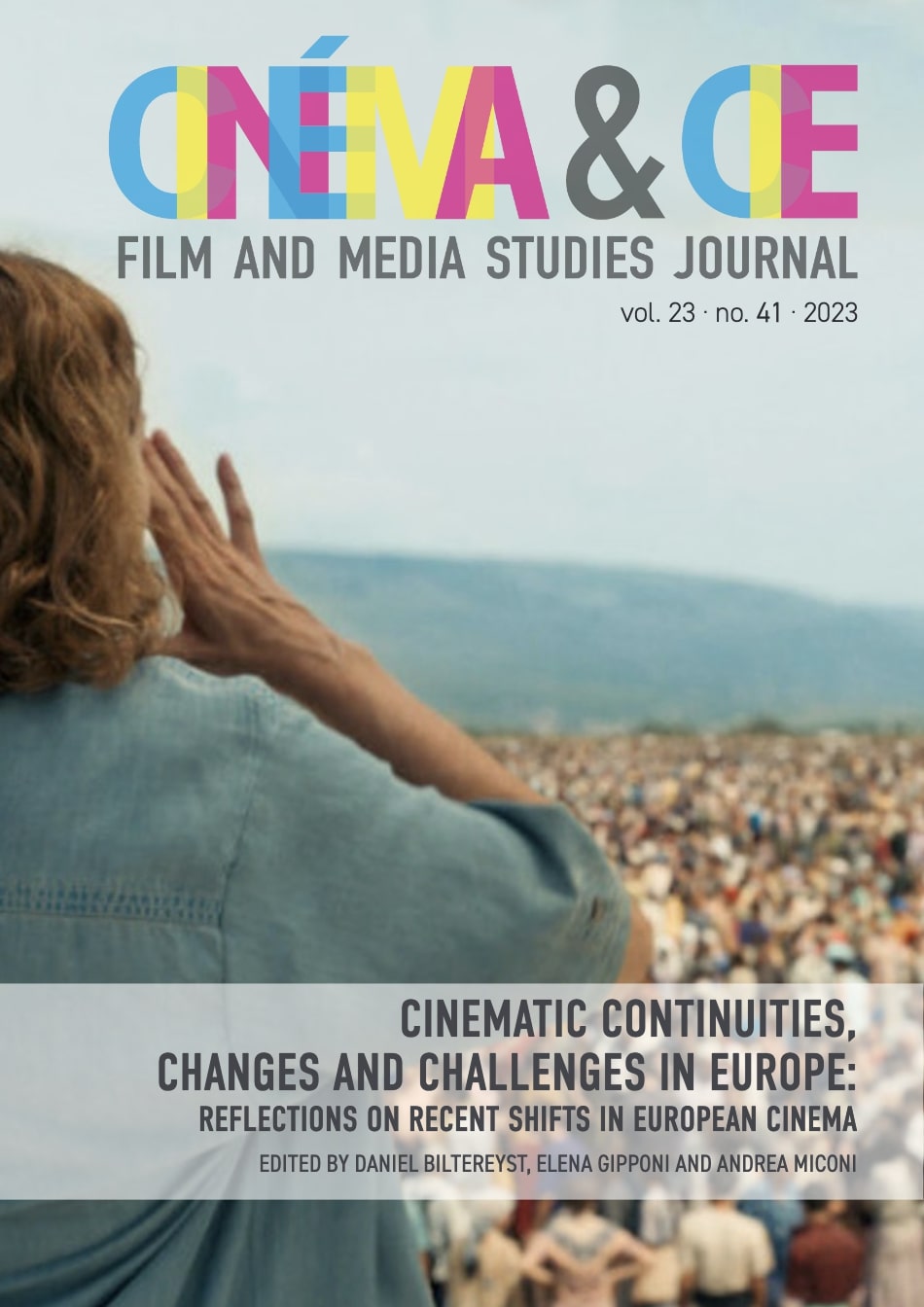Neoliberalism and the Mutations of Social Realism in Contemporary European Cinema
DOI:
https://doi.org/10.54103/2036-461X/20145Keywords:
Precarity, European Cinema, Social Realism, Work, GenreAbstract
Over the last couple of decades film scholars have begun building a critical vocabulary to theorize the new kinds of social relations depicted in the new European cinema of precarity, from “flexible solidarity” and “precarious intimacies” to “the gift economy” and “cruel optimism”. Although the European cinema of precarity continues the legacy of older film traditions like French poetic realism, Italian neorealism and British kitchen sink realism, thus inscribing itself within a well-established European tradition of social realism, the realism of precarity films is often refracted through specific genre tropes or filmic devices—e.g., allegory, experimental cinema techniques, black comedy, cinema verité cinematography etc.—as though social realism is no longer able to render visual the hidden pathologies of neoliberalism or to capture the complexity of Europe’s current political, economic, and moral crisis.
Downloads
References
Bardan, Alice, and Áine O’Healy. 2013. “Transnational Mobility and Precarious Labour in Post-Cold War Europe: The Spectral Disruptions of Carmine Amoroso’s Cover Boy.” In The Cinemas of Italian Migration: European and Transatlantic Narratives, edited by Sabine Schrader and Daniel Winkle, 69–90. Newcastle upon Tyne: Cambridge Scholars Publishing.
Berghahn, Daniela, and Claudia Sternberg, eds. 2010. European Cinema in Motion: Migrant and Diasporic Film in Contemporary Europe. London: Palgrave Macmillan. DOI: https://doi.org/10.1057/9780230295070_2
Berlant, Lauren. 2011. Cruel Optimism. Durham, NC: Duke UP. DOI: https://doi.org/10.1515/9780822394716
Boltanski, Luc, and Eve Chiapello. 2007. The New Spirit of Capitalism. New York: Verso.
Brown, Wendy. 2003. “Neo-liberalism and the End of Liberal Democracy.” Theory and Event 7 (1): 9–17. DOI: https://doi.org/10.1353/tae.2003.0020
Buchsbaum, Jonathan. 1988. Cinema Engagé: Film in the Popular Front. Urbana, IL: University of Illinois Press.
Elsaesser, Thomas. 2018. European Cinema and Continental Philosophy: Film as Thought Experiment. London: Bloomsbury Academic. DOI: https://doi.org/10.5040/9781501396311
Foucault, Michel. 2008. The Birth of Biopolitics: Lectures at the Collège de France, 1978–1979, edited by Michel Senellart; translated by Graham Burchell. London: Palgrave Macmillan.
Frase, Peter. 2013. “The Precariat: A Class or a Condition?” New Labor Forum 22 (2): 11–14. DOI: https://doi.org/10.1177/1095796013482888
Gott, Michael. 2018. “Work, Home, and Flexible Solidarity in Les neiges du Kilimanjaro (2011) and Ma part du gateau (2011).” In Contemporary European Cinema: Crisis Narratives and Narratives in Crisis, edited by Betty Kaklamanidou and Ana M. Corbalán, 37–51. New York: Routledge.
Hardin, Carolyn. 2014. “Finding the ‘Neo’ in Neoliberalism.” Cultural Studies 28 (2): 199–221. DOI: https://doi.org/10.1080/09502386.2012.748815. DOI: https://doi.org/10.1080/09502386.2012.748815
Hardt, Michael, and Antonio Negri. 2005. Multitude: War and Democracy in the Age of Empire. London: Penguin Books.
Harrod, Mary, Mariana Liz, and Alissa Timoshkina, eds. 2015. The Europeanness of European Cinema: Identity, Meaning and Globalization. London: I.B. Tauris. DOI: https://doi.org/10.5040/9780755694822
Harvey, David. 2005. A Brief History of Neoliberalism. Oxford: Oxford University Press. DOI: https://doi.org/10.1093/oso/9780199283262.003.0010
Lazzarato, Maurizio. 1996. “Immaterial Labor.” In Radical Thought in Italy: A Potential Politics, edited by Paolo Virno and Michael Hardt, 133–47. Minneapolis: University of Minnesota Press.
Lazzarato, Maurizio. 2009. “Neoliberalism in Action: Inequality, Insecurity and the Reconstitution of the Social.” Theory, Culture and Society 26 (6): 109–33. DOI: https://doi.org/10.1177/0263276409350283
Lorey, Isabell. 2015. State of Insecurity: Government of the Precarious, translated by Aileen Derieg. London: Verso.
Lyotard, Jean-François. 1989. Differend: Phrases in Dispute. Minneapolis: University of Minnesota Press.
Mayer, Vicki. 2016. “The Production of Extras in a Precarious Creative Economy.” In Precarious Creativity: Global Media, Local Labor, edited by Michael Curtin and Kevin Sanson, 63–73. Berkeley: University of California Press. DOI: https://doi.org/10.1525/9780520964808-007
Miller, Toby, and Marie C. Leger. 2001. “Runaway Production, Runaway Consumption, Runaway Citizenship: The New International Division of Cultural Labor.” Emergences 11 (1): 89–115. DOI: https://doi.org/10.1080/10457220120044684
Morgan, George, and Pariece Nelligan. 2018. The Creativity Hoax: Precarious Work and the Gig Economy. London: Anthem Press. DOI: https://doi.org/10.2307/j.ctt1z27hwj
Morgan-Tamosunas, Rikki, and Guido Rings, eds. 2003. European Cinema: Inside Out: Images of the Self and the Other in Postcolonial European Film. Heidelberg: Winter.
O’Shaughnessy, Martin. 2020. “Beyond Neoliberalism: Gift Economies in the Films of the Dardenne Brothers.” In Cinema of Crisis: Film and Contemporary Europe, edited by Thomas Austin and Angelos Koutsourakis, 43–59. Edinburgh: Edinburgh University Press. DOI: https://doi.org/10.3366/edinburgh/9781474448505.003.0003
O’Shaughnessy, Martin. 2022. Looking Beyond Neoliberalism: French and Francophone Belgian Cinema and the Crisis. Edinburgh: Edinburgh University Press. DOI: https://doi.org/10.3366/edinburgh/9781474448628.001.0001
Ravetto-Biagioli, Kriss. 2017. Mythopoetic Cinema: On the Ruins of European Identity. New York: Columbia University Press. DOI: https://doi.org/10.7312/rave18218
Scribner, Charity. 2005. Requiem for Communism. Cambridge, MA: MIT Press.
Standing, Guy. 2014. The Precariat: The New Dangerous Class. London: Bloomsbury.
Stehle, Maria, and Beverly Weber. 2020. Precarious Intimacies: The Politics of Touch in Contemporary Western European Cinema. Evanston, IL: Northwestern University Press. DOI: https://doi.org/10.2307/j.ctv14161gx
Sticchi, Francesco. 2021. Mapping Precarity in Contemporary Cinema and Television: Chronotopes of Anxiety, Depression, Expulsion/Extinction. London: Palgrave Macmillan. DOI: https://doi.org/10.1007/978-3-030-63261-8
Trifonova, Temenuga. 2020. The Figure of the Migrant in Contemporary European Cinema. London: Bloomsbury Academic. DOI: https://doi.org/10.5040/9781501362484
Wayne, Mike. 2001. Political Film: The Dialectics of Third Cinema. London: Pluto Press.
Downloads
Published
How to Cite
Issue
Section
License
Copyright (c) 2024 Temenuga Trifonova

This work is licensed under a Creative Commons Attribution 4.0 International License.





